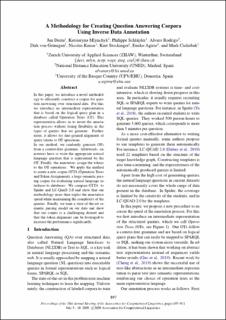Please use this identifier to cite or link to this item:
https://doi.org/10.21256/zhaw-20319| Publication type: | Conference paper |
| Type of review: | Peer review (publication) |
| Title: | A methodology for creating question answering corpora using inverse data annotation |
| Authors: | Deriu, Jan Milan Mlynchyk, Katsiaryna Schläpfer, Philippe Rodrigo, Alvaro von Grünigen, Dirk Kaiser, Nicolas Stockinger, Kurt Agirre, Eneko Cieliebak, Mark |
| et. al: | No |
| DOI: | 10.18653/v1/2020.acl-main.84 10.21256/zhaw-20319 |
| Proceedings: | Proceedings of the 58th Annual Meeting of the Association for Computational Linguistics |
| Page(s): | 897 |
| Pages to: | 911 |
| Conference details: | 58th Annual Meeting of the Association for Computational Linguistics (ACL 2020), online, 5-10 July 2020 |
| Issue Date: | Jul-2020 |
| Publisher / Ed. Institution: | Association for Computational Linguistics |
| Language: | English |
| Subjects: | Natural language interface to database; Artificial intelligence; Deep learning; Semantic parsing |
| Subject (DDC): | 006: Special computer methods 400: Language, linguistics |
| Abstract: | In this paper, we introduce a novel methodology to efficiently construct a corpus for question answering over structured data. For this, we introduce an intermediate representation that is based on the logical query plan in a database, called Operation Trees (OT). This representation allows us to invert the annotation process without loosing flexibility in the types of queries that we generate. Furthermore, it allows for fine-grained alignment of the tokens to the operations. Thus, we randomly generate OTs from a context free grammar and annotators just have to write the appropriate question and assign the tokens. We compare our corpus OTTA (Operation Trees and Token Assignment), a large semantic parsing corpus for evaluating natural language interfaces to databases, to Spider and LC-QuaD 2.0 and show that our methodology more than triples the annotation speed while maintaining the complexity of the queries. Finally, we train a state-of-the-art semantic parsing model on our data and show that our dataset is a challenging dataset and that the token alignment can be leveraged to significantly increase the performance. |
| URI: | https://digitalcollection.zhaw.ch/handle/11475/20319 |
| Fulltext version: | Published version |
| License (according to publishing contract): | CC BY 4.0: Attribution 4.0 International |
| Departement: | School of Engineering |
| Organisational Unit: | Institute of Computer Science (InIT) |
| Published as part of the ZHAW project: | LIHLITH - Learning to Interact with Humans by Lifelong Interaction with Humans EU Horizon 2020: INODE - Intelligent Open Data Exploration |
| Appears in collections: | Publikationen School of Engineering |
Files in This Item:
| File | Description | Size | Format | |
|---|---|---|---|---|
| 2020_Deriu-etal_Question-answering-corpora-inverse-data-annotation.pdf | 556.6 kB | Adobe PDF |  View/Open |
Show full item record
Deriu, J. M., Mlynchyk, K., Schläpfer, P., Rodrigo, A., von Grünigen, D., Kaiser, N., Stockinger, K., Agirre, E., & Cieliebak, M. (2020). A methodology for creating question answering corpora using inverse data annotation [Conference paper]. Proceedings of the 58th Annual Meeting of the Association for Computational Linguistics, 897–911. https://doi.org/10.18653/v1/2020.acl-main.84
Deriu, J.M. et al. (2020) ‘A methodology for creating question answering corpora using inverse data annotation’, in Proceedings of the 58th Annual Meeting of the Association for Computational Linguistics. Association for Computational Linguistics, pp. 897–911. Available at: https://doi.org/10.18653/v1/2020.acl-main.84.
J. M. Deriu et al., “A methodology for creating question answering corpora using inverse data annotation,” in Proceedings of the 58th Annual Meeting of the Association for Computational Linguistics, Jul. 2020, pp. 897–911. doi: 10.18653/v1/2020.acl-main.84.
DERIU, Jan Milan, Katsiaryna MLYNCHYK, Philippe SCHLÄPFER, Alvaro RODRIGO, Dirk VON GRÜNIGEN, Nicolas KAISER, Kurt STOCKINGER, Eneko AGIRRE und Mark CIELIEBAK, 2020. A methodology for creating question answering corpora using inverse data annotation. In: Proceedings of the 58th Annual Meeting of the Association for Computational Linguistics. Conference paper. Association for Computational Linguistics. Juli 2020. S. 897–911
Deriu, Jan Milan, Katsiaryna Mlynchyk, Philippe Schläpfer, Alvaro Rodrigo, Dirk von Grünigen, Nicolas Kaiser, Kurt Stockinger, Eneko Agirre, and Mark Cieliebak. 2020. “A Methodology for Creating Question Answering Corpora Using Inverse Data Annotation.” Conference paper. In Proceedings of the 58th Annual Meeting of the Association for Computational Linguistics, 897–911. Association for Computational Linguistics. https://doi.org/10.18653/v1/2020.acl-main.84.
Deriu, Jan Milan, et al. “A Methodology for Creating Question Answering Corpora Using Inverse Data Annotation.” Proceedings of the 58th Annual Meeting of the Association for Computational Linguistics, Association for Computational Linguistics, 2020, pp. 897–911, https://doi.org/10.18653/v1/2020.acl-main.84.
Items in DSpace are protected by copyright, with all rights reserved, unless otherwise indicated.